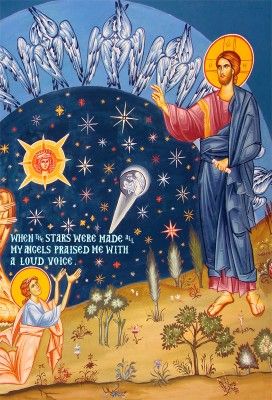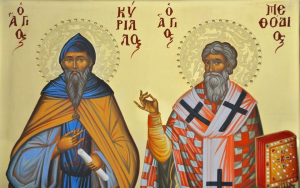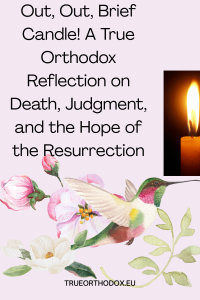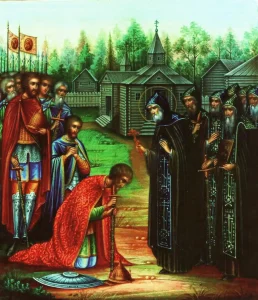Homily Sixth on Genesis by St. John Chrysostom. Why did God Create Day When He did and Why He Created the Stars.

SIXTH HOMILY. And God said, “Let bodies of light be made in. the firmament of heaven, and they light the earth, so that they separate the day and the night and that they serve as signs to mark the times and the seasons, the days and the years. (Gen. I, 14.)
1. The speaker bitterly complains of the eagerness which the day before had caused all the spectators at the circus to see horse races. He blushes for them with that fatal curiosity that makes them lose all the fruit of fasting and the instructions they hear. “Still, if they sin by ignorance, but they know their duties, and they are all the more guilty. The demon alone rejoices at this fatal training since he has stripped them of the spiritual riches they had amassed. But are not these spectacles safe for morals? The speaker responds to this objection by the lively and animated picture of all the perils which the innocence and purity of the soul meet there; and as he sees that his reproaches are keenly felt, he hopes that henceforth he will have no further reason to make them heard. – 3 and 4. He then approaches the explanation of the fourteenth verse of Genesis, and, after a brilliant description of the sun, he observes that this star was created on the fourth day, so that it could not be attributed to him the fecundity of the earth, and that it should not be considered as the first source of light. 5. He then indicates, according to the sacred text, the various usages of the sun and the moon. 6. He ends by exhorting his hearers to recognize the blessings of God by a holy and regular life, and especially by the flight of secular spectacles.
1. I would like to continue the course of our instructions, and I do not know what feeling of repugnance prevents me, for a cloud of sadness offends my sight, and disturbs my mind. Even if this sadness did not go to anger! But, truly, I do not know what to do, as my thoughts are uncertain. And indeed, when I see that the slightest breath of Satan has made you forget the maxims of piety and the wise advice I give you every day, to run to the devilish races of the racecourse, may I happily continue instructions that you have so promptly rendered useless? But what especially irritates me, and moves me to the point of anger, is that despising my exhortations, and forgetting the respect due to the holy quarantine, you let yourself be caught by the traps of the devil. Who, then, would it be harder than a rock to endure such conduct without indignation? So I blush with shame and sorrow, seeing that I exhaust myself unnecessarily and that I sow only in stony ground. Besides, whether you listen to my word or despise it, I am nonetheless assured of my reward, for I have faithfully fulfilled my duty, I will have made known to you the riches of piety, and I can not you will not have spared remonstrances. But I fear, and I tremble that all my zeal does not charge you more strongly. For the servant, says the Gospel, who knows the will of his master and does not perform it, will be struck several times. (Luke, XII, 47.) And who of you could claim ignorance, since every day I put you under the eyes and the traps of the devil and the great facility of the virtue if you want to be attentive and vigilant?
Do you not know, therefore, that the Scripture compares to dogs those Christians who thus neglect their salvation, who come to our temples today, and tomorrow let themselves be caught in the trap of the devil? The man, says the Wise One, who is rising from his sin, and who commits it again, is like the dog returning to his vomit. (Prov.XXVI, 11.) Do you see which animals look like those of you who have attended these illicit shows? and have you forgotten this sentence of the Savior: Every man who hears my words, and does not do them, shall be like the fool who built his house on the sand; the rivers came, and the winds blew and rushed upon this house, and it fell, and its ruin was great? (Matt VII, 26.) But those who have been seen running to the hippodrome are even more insane. For, according to the Gospel, the house of the fool fell only after strong tremors. This is what gives us to understand these expressions rivers and winds, which do not designate the flood and the storm, but the violence of temptations. And in the same way, the ruin of this house does not mark the overthrow of a material edifice, but the fall of a soul which succumbs under the weight of the grave afflictions to which it could not resist. Against you, on the contrary, the winds were not broken, and the rivers did not precipitate; a slight breath of the devil was enough to overthrow all of you.
Is it madness more unforgivable! What is the fast for? I’m asking you, and why come here? Who would not regret your misfortune and mine? Yours, since you have lost in a moment those treasures of piety so laboriously amassed, and you have opened your soul to the devil yourself as if to facilitate the theft of your spiritual riches; and we, who will not complain to us to speak with insensible ears, and to be so unhappy as to sow every day, and to reap nothing! Do you believe, then, that I am zealous to announce to you the holy word only to flatter your ears, and seek your praises? No no; and if you do not withdraw any fruit from my speeches, it is better for me now to be silent: for I do not wish to be the cause of a more severe condemnation. The merchant, who has gone on a ship, has loaded him with a rich cargo, and who sees him perish, by the violence of winds and storms, presents to us the painful spectacle of a man escaped naked from shipwreck and fallen from an immense opulence in the most dreadful indigence. This is also what the demon did to you. He saw that your soul, like a spiritual vessel, was filled with precious riches, and that you had gathered a real treasure through your fasts and your diligence in coming to hear the holy word. So he hastened to unleash the storm, that is to say, these useless and dangerous races of the hippodrome, and by this fatal curiosity, he has stripped you of all your goods.
2. These reproaches are too vehement, I feel it, but forgive them for my zeal, and suffer that I thus ease my pain. Besides, it is not hate that inspires my words, but a heart that loves you, and seeks only your salvation. That is why I relax from my severity, and, happy to have been able to stop the progress of the anal, I want, my dear brothers, to revive in you a good hope, so that you do not surrender to despair, and that you do not lose courage entirely. For there is this difference between temporal misfortunes and spiritual losses, that we can not in a moment recover from extreme indigence, and rediscover our first opulence, while the divine mercy offers us every facility to recover promptly our old state. It is enough that we want to hate our faults, and to shake from now on a culpable inaction. This is indeed the Master whom we serve, and such is his goodness and his liberality. So he assures us himself through the mouth of a prophet: Let him not desire the death of the sinner, but be converted and live. (Ezek. Xviii. 23.) I know, besides, that you are good, and that you feel the unworthiness of your conduct. Now, it is already a great step to return to virtue to know the greatness of his fault.
But do not blame me for this false and diabolical excuse, and do not tell me what harm is it to go to horse races? Because if you want to observe carefully everything that happens, you remain convinced that everything is done at the instigation of the demon. We do not only see horses running, but we hear shouts, blasphemies, and inappropriate speeches. Courteous courtesans show themselves publicly, and effeminate youngsters were their softness. Is this a slight evil, and is not enough to seduce and captivate souls? too often a chance encounter surprises and precipitates into the abyss the imprudent who is not on his guard; and what will those who voluntarily rush to the hippodrome, who satisfy their eyes with these lascivious spectacles, and come back with adulterous eyes? The Lord knew well that man is only too exposed to temptation, and he was not unaware of the malice and wiles of the devil; so he wanted to protect us against (31) our weakness, and make us invincible against the attacks of our enemy, by promulgating this law: Whoever has looked at a woman to covet her, has already committed adultery in her heart. (Matt V, 28.) Thus, according to the Gospel, a too curious look is consummated adultery.
So do not say what harm is there to attend the circus! since the mere sight of the horse races is enough to cause our soul many damages. And indeed, is it not really wasting time to consecrate it to useless spectacles, which, far from serving our salvation, can only become dangerous to it? One argues, one warms up, and one spreads it in words little decent. How to deserve our pardon, and what an excuse to claim! Should I add that if I extend my instructions a little, many become angry and angry? They pretend the delicacy of a temperament which can not bear the fatigue of a long speech, although the admirable structure of this temple preserves us from all inconvenience, and shelters us against the cold, the rain, and the wind. But in the circus, despite torrents of rain, despite the violence of the hurricane, and the rays of a burning sun, these same people remain one hour, two hours, and even almost all day. The old man forgets the respect he owes to his white hair, and the young man does not blush to imitate this scandalous example. The blindness is so great that all drink with delight at this poisoned cup; and no one reflects on the short duration of this fatal pleasure which must follow an eternal remorse and the accusing voice of conscience. But I read on your faces the confusion of your souls and the sincerity of your repentance. I conjure you, therefore, not to return to the same faults, and, after this severe admonition, to no longer frequent these shows and these diabolical assemblies. It is not always expedient to use only mild and light remedies; and when the wound resists this first treatment, gangrene must be prevented by violent and energetic remedies.
3. So that the guilty ones know that if, after this solemn warning, they neglect to correct themselves, we will stop tolerating them. Yes, we will employ the severity of the laws of the Church, and all the vehemence of our zeal to repress these disorders, and prevent this scorn of the holy word. No doubt this warning does not concern everyone here, and it only looks at the guilty. But I speak in general, and I leave it to each one to make the application of my words. The guilty must go out of his sin, and not fall back there. He must also arm himself with zeal against himself to return to piety, and repair his faults. He, on the other hand, who has nothing to reproach himself with, will not neglect to keep himself even better on his guard, and he will fear falling into sin. For the rest, the facts themselves prove to you, my dear brethren, that my heart thus exhales his grief only because he loves you, and cares for you. It is our ardent solicitude for your salvation which alone has inspired our words, and because our soul is full at this moment of the best hopes, we will resume the course of our instructions. But in giving you this mark of my paternal affection, I beg you to listen to me attentively, so that you may return to your houses more abundant fruits.
And first, you have to remember what has just been read. And God said, Let bodies of light be made in heaven, and let them light the earth, that they may separate day and night, and that they be signs to mark the times and the seasons, the days, and the seasons. the years, that they shine in the firmament says heaven and that they illuminate the earth. And this was done so. (Gen. I, 14, 15.) Yesterday the holy prophet Moses told us how the Creator of the universe embellished the earth, which at first was gross and unformed. He describes it with an infinity of plants, flowers, and trees; and today the sacred writer will tell us about the decoration of the sky. For as the earth beautifies itself with its own productions, the Lord has given the firmament a brighter and more brilliant brilliance by the variety of the stars with which it has sprinkled it, and especially by the creation of two great luminous bodies. , the sun and the moon. And God did, says the Scripture, two great luminous bodies, one greater to preside over the day, and the other lesser to preside over the night; and he made the stars too. (Gen. I, 16.) Admire here the wisdom of the divine Worker. He says a word, and suddenly the sun is created; the sun, that admirable star which Moses calls a great light, and which he says he was made to preside over in the day. It is indeed from this star that the day borrows its brightness, and it is from its rays and its splendor that it streams itself of brightness and light. Every day he displays to our eyes his beautiful beauty, and as soon as he appears on the horizon, he invites all men to resume their work.
The holy king David, speaking of this beauty of the sun, compares this star to a husband who comes out of his nuptial bed. He springs, he says, like a giant in his career; it starts from the extremities of dawn and falls below the limits of the sunset. (Ps. XVIII, 6, 7.) What a sublime image of the splendor of the sun and the speed of its course! For when he tells us that he starts from the extremities of dawn and falls to the limits of the sunset, the Psalmist points out that he travels the universe as in a moment and that he spreads his light and his benefits from one border of the world to another. Sometimes it warms the earth and dissipates moisture, and sometimes it dries and burns it; in a word, the services it renders us are as numerous as they are varied, and such is the excellence of this celestial body that we can not praise it with dignity. But neither my words nor this pompous eulogy are intended to concentrate your admiration on this star. I want, on the contrary, my dear brothers, that you rise higher, and that creature you go back to the Creator. For the brighter the sun is, the more excellent is He who created the sun.
4. But the Gentiles, who admired us like this star, did not bring their views higher and did not praise the Creator; they stopped at the creature and gave him divine honors. This is why the Apostle said: They worshiped and served the creature rather than the Creator. (Romans I, 25.) They were real fools who could not recognize the Creator in his creatures, and who fell into such a strange misguidance that they put the creature in the place of the Creator.
This is why the Holy Spirit, who knew how much man is prone to error, teaches you that the sun was created only on the third day; but already the earth had sprouted its various productions and clothed itself with its rich ornaments: and God had ordained it, that it could not be said later that harvest and fruit could not ripen without the sun. Thus Scripture teaches you that before the creation of the sun, plants and fruits existed, lest you attribute to it this happy fruitfulness; it belongs wholly to the Divine Worker who, from the beginning, pronounced this word: May the earth produce lush plants. Do you agree that the cooperation of the sun promotes the maturity of fruits and harvests? I do not deny it. For although the plowman helps the fertility of the earth, it does not follow that he is the author of this fecundity; On the contrary, when he multiplies even his cares and his labors, he would wear himself out unnecessarily, if the Lord, whose word from the beginning made the land suitable for producing the fruits, did not continue this marvelous disposition to him; yes, neither the work of the plowman, nor the influence of the sun and the moon, nor the concurrence of the seasons, would be of any use to us if the hand of the Lord did not lend them his mighty assistance. But when God gives them his blessing, the elements themselves contribute a lot to the fertility of the earth. So print deeply these truths in your memory, and retaining those who would like to go astray, do not allow them to return to the creatures the honor which belongs only to the Creator.
Observe, indeed, that the Holy Scripture, which depicts to us the beauty of the sun, its grandeur and its usefulness under this beautiful image: Like a husband, he springs like a giant in his career, also speaks of his weakness and of her failings: What is brighter than the sun, she says, and yet the sun will be extinguished. (Ecclesia XVII, 30.) It is as if she were telling us: Do not be seduced by this admirable spectacle; for if the Creator ordained it, this beautiful star would disappear at once and return to nothingness. The knowledge of these truths would have preserved the pagans from their monstrous errors, and they had understood that the sight of creatures was to elevate them to the Creator. The sun was also created only on the fourth day, so that man should not regard him as the author and the principle of light. Because, what I said about the production of plants, I can say it again of the light, to know that three days preceded the creation of the sun. The Lord only wanted this star to increase the brightness of the day; the same must be said of the moon, which is a luminous body less (33) large, for three nights passed before it was created. It is not that it is not marvelously useful to us; since it dispels the darkness of the night and fulfills, almost the same functions as the sun: this one was created to preside over the day and the moon, to preside over the night. But what does this expression mean: to preside over the day and preside over the night? it marks, according to Scripture, that the sun illuminates the day of fire with its brightness, and that the moon, by dissipating the darkness of the night, helps men by its soft light in the accomplishment of their labors. And indeed the traveler pursues his route with more confidence, the pilot directs his ship better on the immensity of the seas, and each goes without fear to his works and his occupations. After making you aware of the usefulness of these two great lights, the sacred writer adds that God also made the stars and he placed them in the sky to shine on the earth, to preside over the day and the night, and to separate the light from the darkness. (Gen. I, 17, 18.)
5. These words make us know what God’s purpose was in creating the stars. He has placed them, says Moses, in the firmament of heaven. What to say? Did he nail them there? Not certainly; since we see them in an instant pass over immense spaces, and accomplish with incessant motion the various revolutions which the Lord has traced to them. What is the meaning of this expression: he placed them? It means that he assigned them heaven for dwelling. This is how Scripture will also tell us that God placed Adam in the earthly paradise. (Gen. II, 8.) He did not fix it immutably, but he placed it there for him to live in it; and so we say that the Lord wanted the stars to be as attached to the vault of the firmament, so that from the height of heaven they could light the earth. Now, I ask you, my dear brother, the enamel of our meadows, and the flowers of our gardens are they as beautiful as the sky, when in the middle of the night it sparkles with the fire of the stars. The brilliant variety of these stars embellishes it and the parsimony of sparkling flowers which send us an abundant light. For the stars were created to light the earth, and to preside over the day and the night. This observation has already been made especially concerning the sun and the moon; but here Moses, after revealing to us the creation of these two great bodies of light, and that of the stars, adds, in. speaking of all, that God made them to preside over the day and the night, and to separate the light from the darkness. If the stars do not appear during the day, it is because the brightness of the sun veils them to our eyes; and likewise the sun does not shine during the night, because the light of the moon is enough to dispel the darkness. Moreover, all the stars remain within the limits which are traced to them; they do not depart from it, and each of them obediently obeys the Lord’s orders, and fulfills his ministry.
But who would explain all the other benefits that the sun, the moon and the stars provide to man? They serve as signs, says the Scripture, to mark and times, and days, and years. What do these words mean: and the times, and the days, and the years? The sacred writer wished to teach us that the course of the stars regulates for us that of the times, or seasons, which their daily revolution brings to us day and night, and that their periodicity designates that of the years. These observations are sufficient for our needs. And indeed, the pilot, who knows the course of the stars and observes the sky, embarks on the faith of his calculations, crosses the seas, and in a deep night is guided by the sight of the stars, so that by they drive his ship and all the passengers safely. Thus still the course of the stars indicates to the plowman the favorable season of its labors. He knows when he must sow the land, give it various plowing, and prepare his sickle to harvest his grain. Let us also add that the knowledge of the times, the calculation of the days and the cycle of the years are of a daily and infinite use to us, and the relief that we withdraw for our well-being are so numerous that it would be impossible to list exactly. The little I have said is enough to give us a high idea of it; and having admired creatures, do not neglect to worship and celebrate the Creator. Yes, let us praise his ineffable kindness to us, since he created the world only for man, and soon he will introduce him as the king and master of all creatures.
And God saw, says the scripture, that it was good. Every day of creation, the sacred writer observes that God approved his cover, in order to remove any pretext for those who dare to (34) criticize it. This is, as the context proves, the purpose of Moses; otherwise it would have been enough to say in general that God saw that all he had done was good. But because the Lord knows the infirmity of the human spirit, he wanted to praise separately each of his works, in order to make known to us the sovereign wisdom and ineffable goodness that presided over their creation. And in the evening and the morning was the fourth day. God, who had first placed two great bodies of light in the sky, completed the ornamentation by decorating it with the fire of the stars. This was the work of the fourth day, as Moses tells us, saying that evening and morning was the fourth day. But if he repeats himself thus every day of creation, it is to better engrave in our minds his divine instructions.
6. It is therefore important for us to engrave them, in the depths of our hearts, and to shake off our habitual negligence, so that, better informed by the dogmas of our religion, we may in every spirit of gentleness, enlighten the Gentiles, and dispel their errors. Let us prevent them from confounding the order of things, and worshiping instead of the Creator, creatures that have been made only for our salvation and our utility. Yes, had my word raised all the Gentiles, I will publish in a loud voice that the world was created only for man. For God is self-sufficient, and he needs none of these external goods. But the creation of the universe manifests us his goodness; and he has surrounded man with so much honor and esteem that he has given him creatures to lead him to the knowledge and worship of the Creator. And indeed, is it not absurd to rave about and to prostrate oneself before such beautiful creatures, and not to raise one’s thought to the One who made them! Why should we not believe this word of the Apostle: The invisible perfections of God have become visible since the creation of the world, by all that has been done? (Romans I, 20.) Answer me, O man! When you contemplate the sky, do not you admire this beauty which results from the variety, the elevation and the splendor of the stars? But do not stop at these sensitive objects, and reach by the thought of the Author of so many wonders. The brilliancy of the sun delights you with astonishment, the various phenomena of its light surprise you, and the splendor of its rays, which dazzles your eyes, transports you with admiration. But do not stop there; seeing that a simple creature is so excellent that it escapes all human appreciation, understand how great and powerful is He who has produced it by one word. Apply the same reasoning to the earth. When you see it enamelled with a thousand flowers, as with a garment dotted with embroidery, and covered with fruits and harvests, do not attribute to it this admirable fertility, and be careful also to pay tribute to the cooperation of the sun and the moon; but remember that before the creation of these two stars the Lord had said that the earth produces the green plants, and that suddenly the earth took on its rich ornaments.
If we were doing these reflections every day, we would be grateful to the Lord, and we would praise him as much as he deserves, or at least as much as our strength would allow. But the best way to glorify Him is to lead a holy life, and not to fall back into our old sins. Therefore, let us not be deceived by the illusions of the devil, and deserve divine grace and mercy through vigilant attention to ourselves, great zeal, and diligence in the duties of public prayer. For the Lord is so merciful to us, that he is satisfied with our efforts to avoid sin, and makes the practice of good works himself. Let none of you, I implore you, appear gilded in circus games, and consume part of the day in meetings and useless talks; let none of you devote yourself to the passion of games of chance, and mingle with the indecent cries and the thousand disorders which accompany them. Hey! what does it serve you for, I ask you; to fast and to take no food until evening, if you spend the whole day playing dice, if you allow yourself to be amusing amusements, and if at last you pronounce swearings and blasphemies? Ah! Let us not be so indolent for all that concerns our salvation, and that all our conversations are on spiritual matters. It would even be good if everyone had in their hands some of our holy books, and who, uniting his friends, could be edified with them by a pious reading. These practices will powerfully help us to avoid the traps of the devil, and to gather from our fast abundant fruits. They will also deserve the grace of the Lord through ineffable goodness; from God the Son, to whom be, with the Father and the Holy Spirit, glory, empire and honor, now, and in all ages and ages. So be it.






